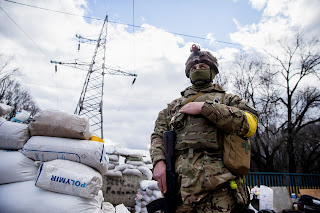With social media, many of us are watching atrocities happening in Ukraine in real time, and it is not surprising that many of us are reflecting on our own war experiences, whether it’s Vietnam, Iraq, Afghanistan or anything else. These events can activate a fight-or-flight response, and I've heard many Veterans comment that they wish they could join the fight themselves.
But what do we do when these triggers bring back our PTSD symptoms in full force? We've got answers, so let's take a moment to review PTSD triggers and what we can do about them.
Understanding Triggers
We all have physical and psychological reactions to threats. This is our brain’s way of keeping us alive, and that is a good thing. This means that our bodies and our brains respond when triggered. Triggers are stimuli that cause our bodies and brains to react.
Triggers can be internal (like pain) or external (like fireworks) and they can bring us right back to remembering our past trauma. The smell of our attacker’s cologne, a box in the middle of the road, the sound of a gunshot - these are all examples of potential triggers.
Triggers can affect us in a variety of ways, making our hearts race to having a full-blown panic attack. Unfortunately, we don’t know our triggers until we experience them. It’s the worst kind of surprise.
And this is where Russia's war on Ukraine comes in; it brings with it many potential triggers because the situation is quickly changing and uncertain. All that not knowing is a trigger generator, and there is conflicting information, a feeling of helplessness, and atrocities happening in real time streaming video online. These triggers can cause flashbacks, hypervigilance, anxiety, inability to relax or sleep, nightmares, and a desire to withdraw from our lives or even end our lives.
Unfortunately, this is normal. Our brains react to triggers and work hard to keep us alive. Let’s take a knee and respond.
How Do We Respond To Triggers?
First things first: it’s important to stop and choose to be compassionate with ourselves. This war is hard on folks who have no history of trauma and have lots of money and resources available, so let’s intentionally try to be easy on ourselves. Experiencing a trigger is not a character defect. It is our brain’s way of keeping us alive.
To respond to triggers rather than let them control us, we can create a simple three-step plan: (1) intentionally disengage from things that trigger us (for me that is doomscrolling), (2) explore triggers, and (3) create a self-care plan.
Here’s How This Looks
(1) Let's unplug (seriously) and reach out to someone we trust to help keep us accountable. If we don't have anyone who can help us, then we can use technology. Pick a firm time and set an alarm to remind you when it is time to unplug and shift gears.
(2) Explore triggers with a counselor or trusted ally or through journaling. Really take time to understand why your brain feels triggered. PTSD is a very logical disorder, and it is likely that your brain is stressed and anxious. Talking about it and journaling about it will help release anxiety and pressure.
(3) Create a plan of self-care. It is important to engage in self-care and ensure we are taking care of ourselves physically, emotionally, spiritually, mentally, and emotionally. Triggers can kick us out of gear and affect our sleep, our schedule, and our thoughts and feelings. There are great self-help guides available online, and we can use these to talk with those who support us.
Triggers are normal and do not mean that we are damaged. We absolutely can come back from our PTSD and reclaim our lives.
*****
“If you believe change is possible, you want to change, and you are willing to do the work, you absolutely CAN get your life back.”
Get your copy of The Soldier's Guide to PTSD, The Soldier's Workbook,
or Acknowledge & Heal, A Women's-Focused Guide to PTSD


